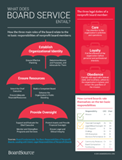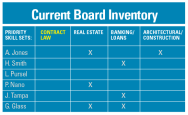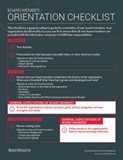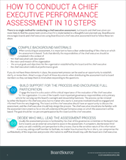
A nonprofit board’s responsibilities run the gamut—from fiduciary oversight to strategic planning and from executive evaluation to fundraising. This resource center from The Bridgespan Group and BoardSource provides guidance on how to find a rewarding board position, how to build a board, and what it takes to be an effective nonprofit board.

This infographic from BoardSource provides an overview of the main role of board members, including the 10 basic responsibilities and three legal duties of nonprofit board members.

This checklist, from BoardSource's Ten Basic Responsibilities of Nonprofit Boards, is designed to help your organization’s leadership identify important board responsibilities. It also helps you better understand how well the board is operating overall and performing in particular areas, such as establishing identity and direction, ensuring necessary resources, and providing oversight.
The Bridgespan Group
Make sure that your passions and unique abilities are a good match with the nonprofit’s mission and needs, says Phyllis Yale, a senior advisor to Bain & Company and a member of the Bridgespan Board of Trustees. In this Q&A, she shares more advice for potential nonprofit board members, including how to ensure fit and how her for-profit skills have helped her contribute to the nonprofit boards on which she serves.
Serving on a nonprofit board can be a rewarding experience, but it is also time-intensive and demanding. Review these key questions from BoardSource before joining a board to ensure that board service is right for you.
The Bridgespan Group
Becoming a member of a nonprofit organization's board can be a meaningful way to explore how an individual's experience and expertise can be applied in the nonprofit sector at the governance level, and ultimately, how one's experience and expertise can help advance a nonprofit organization's social impact. It also can be a rewarding, high impact way for for-profit executives to do community service while learning new skills that can enhance their own careers.
There’s no one-size-fits all solution to building a nonprofit board. To determine the best size for your board, consider the pros and cons of small and large boards shared in this BoardSource article.

Karen Beavor, Georgia Center for Nonprofits
To fulfill your nonprofit's strategic goals, you need a well-rounded, fully functional board capable of taking on any challenge. Here’s how to get one using three simple tools from the Georgia Center of Nonprofits.
By understanding the power of diversity and by utilizing it appropriately, a nonprofit board possesses the basic tools for creating a responsive and open-minded organization. This BoardSource article explores how to approach defining board diversity, how to avoid tokenism, and how to deal with dissent among diverse board members.

This job description from BoardSource provides a concise overview of the general expectations for board members on which you can build your own job description for recruiting purposes.
The Bridgespan Group
This sample board chair job description highlights the overall responsibilities of the board chair and describes particular responsibilities around fundraising.

Ensure you’re providing new board members with the necessary materials and information during the orientation process. This nonprofit board orientation checklist from BoardSource outlines general expectations of board members and materials and information to provide new board members.

Even the most organized, responsible, and amiable nonprofit board needs to document its activities, internal rules, and processes. Use this infographic from BoardSource to learn more about the documents to which your board needs to pay attention.
The Bridgespan Group
Board performance is widely recognized as a critical ingredient in a nonprofit organization’s ability to achieve impact. This article explores the key elements of what effective board performance looks like and how nonprofit boards can become more effective.
Lisa Walsh, Libbie Landles-Cobb, and Leah Karlins, The Bridgespan Group
The number one responsibility of any board—for-profit or nonprofit—is effective management of the senior executive, especially a new one. Yet, nonprofit leaders often report to Bridgespan that their boards fall short of that goal. Here are five ways nonprofit boards can more effectively onboard and support their new CEOs.

One of the board’s most important responsibilities is to assess the chief executive. The 10 steps outlined by BoardSource for those using its chief executive assessment tool provide guidance on how to implement your own approach.
The Bridgespan Group
To illustrate how boards and new CEOs can lay a good foundation, we spoke with three CEOs and two board chairs about the preliminary steps they took to ensure their relationships worked from day one.

This work is licensed under a Creative Commons Attribution 4.0 International License. Permissions beyond the scope of this license are available in our Terms and Conditions.
Network boards are retooling their structures and how they work to better support their organizations as they tackle today's toughest challenges.